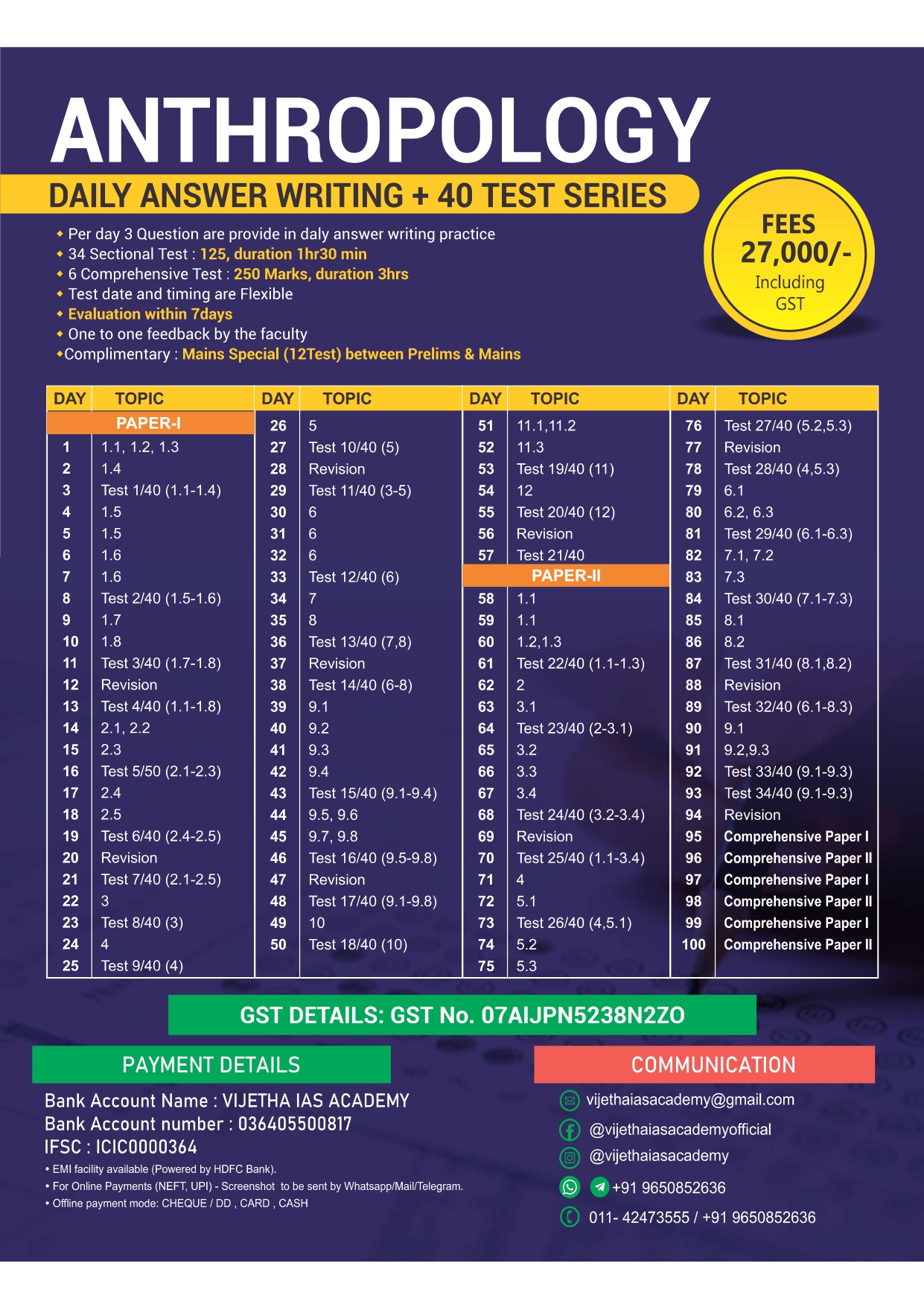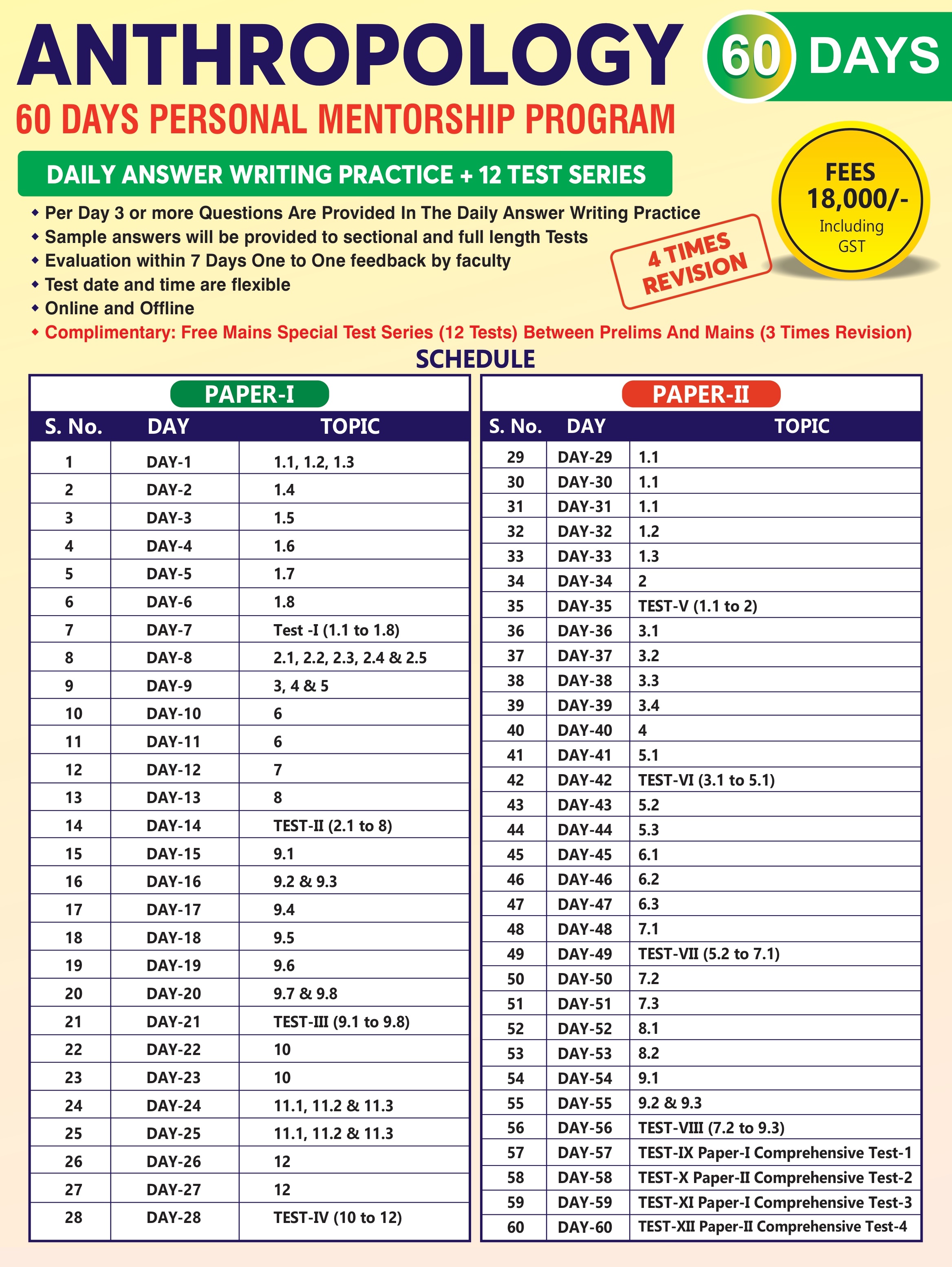
What are the ethical concerns in biological and socio-cultural anthropology because of recent advances in AI and genetic research?
(20 Marks) Anthropology Optional Paper CSE 2024
Introduction
The rapid advancement of Artificial Intelligence (AI) and genetic research has revolutionized various fields, including biological and socio-cultural anthropology. While these technologies offer new insights into human evolution, genetics, and social behavior, they also raise significant ethical concerns. Issues related to privacy, consent, inequality, and the misuse of data have emerged, leading to debates on the responsible use of AI and genetic technologies within anthropology.
Main Body
Ethical Concerns in Biological Anthropology:
With advancements in genetic research, such as genome sequencing, there are concerns regarding the privacy of individuals' genetic data. This is particularly important in anthropological studies where genetic information of indigenous and isolated populations is often collected.
Ensuring informed consent is a challenge, as communities may not fully understand the implications of sharing their genetic data, which can be used beyond the initial research purpose, leading to potential misuse by third parties or corporations.
Ownership and Misappropriation of Genetic Material:
The question of who owns genetic data is crucial, especially in cases where indigenous populations’ genetic information is used for research. Historically, genetic material has been extracted from tribal groups without adequate compensation or recognition of their contributions.
This raises concerns about biopiracy, where genetic resources are exploited for commercial gains, without benefiting the communities from which they were taken.
Eugenics and Genetic Engineering:
Advances in CRISPR and other gene-editing technologies have reignited debates around eugenics and the potential for designer babies. These technologies, if misused, could lead to the revival of ideas about racial superiority or attempts to “improve” the human genome, reminiscent of past ethically problematic practices in anthropology and genetics.
Ethical regulation is needed to ensure that genetic research does not reinforce social inequalities or support discriminatory practices based on genetic traits.
Exploitation of Vulnerable Populations:
Indigenous and marginalized communities, whose genetic data is often sought after for research on human origins or unique adaptations, are vulnerable to exploitation. Anthropologists and geneticists must ensure that these groups are not used as mere subjects of study, but rather active participants in research, with benefits and protections guaranteed to them.
Ethical Concerns in Socio-Cultural Anthropology:
AI technologies, such as machine learning and big data analysis, are increasingly used in socio-cultural anthropology to analyze large datasets, including language patterns, social media behavior, and cultural trends.
A major ethical concern is the potential for bias in AI algorithms, which can lead to misrepresentation of cultural data. AI systems are only as good as the data they are trained on, and if that data is biased, the outcomes could perpetuate stereotypes or offer misleading conclusions about cultural practices.
Surveillance and Privacy Violations:
AI-driven technologies, such as facial recognition and data mining, have the potential to infringe on the privacy of individuals and communities. In anthropology, where ethnographic work involves intimate, in-depth study of communities, the use of AI for monitoring or data collection raises concerns about the surveillance of marginalized populations.
The use of personal data from social media for anthropological research, without obtaining informed consent from the subjects, can lead to ethical violations, as individuals may not be aware their information is being used for research purposes.
Cultural Sensitivity and AI:
AI lacks the cultural sensitivity that human anthropologists bring to the study of social groups. Anthropological research requires a nuanced understanding of contextual meanings, traditions, and local norms, which AI systems may misinterpret or oversimplify.
This raises ethical questions about the validity and reliability of AI-generated insights in socio-cultural anthropology, particularly when studying indigenous or non-Western cultures, where AI may impose Western-centric frameworks.
Data Commodification and Inequality:
The commodification of anthropological data through AI-driven platforms raises concerns about the monetization of cultural knowledge. In some cases, corporations and governments may use AI to extract and commercialize cultural data, exacerbating inequalities between communities that are studied and the entities that profit from their data.
This highlights the need for ethical guidelines to ensure that communities whose data is used are compensated or given control over how their information is used.
Cross-Cutting Ethical Concerns:
Both genetic research and AI-based anthropological studies often involve complex technologies that are not easily understood by research subjects. Ensuring truly informed consent—where participants fully understand how their data will be used and the potential risks—is a significant challenge.
For indigenous and tribal populations, there is often a power imbalance between the researchers and the communities, further complicating the process of obtaining meaningful consent.
Risk of Exacerbating Inequalities:
Advances in both genetic research and AI may deepen existing social and economic inequalities. For example, genetic data could be used to develop medical treatments that are inaccessible to the marginalized populations from whom the data was sourced.
Similarly, AI tools may reinforce existing socio-economic divides, as their benefits are often concentrated in wealthier regions or among those with technological access, leaving behind underprivileged groups.
Accountability and Ethical Governance:
The integration of AI and genetic research in anthropology demands robust ethical governance frameworks. Researchers must be held accountable for the way they collect, process, and use data. This requires international standards for data protection, privacy, and cultural sensitivity, as well as community-led oversight in research involving indigenous populations.
Conclusion
The recent advances in AI and genetic research have provided anthropologists with powerful tools to explore human biology and culture in unprecedented ways. However, these technologies also present significant ethical challenges in terms of privacy, consent, data ownership, and the risk of reinforcing inequalities. Anthropologists must navigate these ethical concerns by ensuring transparent, informed, and culturally sensitive research practices. Establishing strong ethical frameworks that protect the rights and autonomy of individuals and communities is essential to maintaining the integrity of biological and socio-cultural anthropology in the face of rapidly advancing technologies.
Anthropology Test Series Programme (Online + Offline))
We provide Anthropology Daily Answer Writing a range of programs designed to cater to various stages of UPSC preparation. Whether you're just starting out, have attempted the Mains before, or are getting ready for Mains 2024, we have the right option for you. Allow us to assist you in choosing the course that best fits your needs.
|
Level of Preparation |
Test Series Program |
Test Series Content |
Test Schedule |
|
Self-study of Anthropology Optional |
Anthropology 100 Days Personal Mentorship Program |
Daily answer writing, 34 sectional tests, 6 comprehensive tests, and complementary Mains Special 12 tests (between prelims and mains) |
|
|
Revise whole syllabus through Daily Answer Writing Practice and Tests |
Anthropology DAW Mentorship Program |
Daily Answer Writing Practice and 8 sectional and 4 Full Length tests |
|
|
Revise whole syllabus through Sectional and Full Length Tests |
Anthropology Tier- I T-40 Test Series |
34 Sectionals and 6 Full Length Tests |
|
|
Written Mains earlier and need more practice |
16-Anthropology Tier II Test Series |
10 sectional and 6 Full-Length Tests. |
|
|
Cleared Prelims 2023 and are preparing for Mains 2023 |
Mains Special 12 Tests program |
8 Sectional and 4 Full-Length Tests |
ANTHROPOLOGY MAINS SPECIAL COURSES
Enroll in our Anthropology Mentorship Program today and take the first step towards achieving your UPSC goals!
1) If you are going for Self study of Anthropology Optional and looking for a Comprehensive Program that includes Daily Answer Writing, 34 Sectional tests, 6 Comprehensive tests, and Complementary mains special 12 tests (between prelims and mains), our Anthropology 100 Days Personal Mentorship Program is the perfect choice.
2) If you want to revise Whole Syllabus through Daily Answer Writing Practice and 8 sectional and 4 full length tests, then our Anthropology DAW Mentorship Program is the best fit for you.
3) If you want to revise Whole Syllabus through 34 Sectionals and 6 Full Length Tests then Anthropology Tier- I T-40 Test Series is for you.
4) If you have written Mains earlier and need more practice, then our 16-Anthropology Tier II Test Series is a great option. This test series includes 10 sectional and 6 full-length tests.
5) if you have cleared Prelims 2023 and are preparing for Mains 2023,our Mains Special 12 Tests program is a must-have. This program includes 8 sectional and 4 full-length tests to help you prepare for the big day.
For more information on Vijetha IAS Academy’s Anthropology mentorship programs Deatils : https://vijethaiasacademy.com/anthropology-test-series
Anthropology 100 Days Personal Mentorship Program ( 7 + 3 Times Revision )

Anthropology 60 Days Personal Mentorship Program ( 4 + 3 Times Revision )

For more information: https://vijethaiasacademy.com/anthropology-test-series
Details Of Anthropology Classes Program
Top Anthropology Optional IAS Coaching Center in Delhi Vijetha IAS Academy | Best Anthropology Optional IAS Coaching in Delhi
Fee Structure:
- Tier 1: Rs. 55,150/- (3 Years Validity of Offline/Live Batch)
- Tier 2: Rs. 42,000/-
- Tier 3: Rs. 36,000/-
Batch Size: 50 – 60 Students
UPSC Notes
Anthropology Optional IAS Coaching Notes, IAS Exam Preparation Booklets, IAS optional coaching Notes, UPSC Coaching Notes, Video Lectures, Live Classes with faculty, Chat Facility Available
Teachers Name: N P Kishore Sir
Past Result
- Last Years Result 2023
- 35 Total Selections in CSE 2023
Google Reviews: 4.9 out of 5 stars
Website: Vijetha Anthropology Optional IAS Coaching in Delhi (https://vijethaiasacademy.com)
Faculties of Vijetha IAS Academy
- N P Kishore Sir
Features
- Vijetha IAS Academy offers Online and offline Courses for better preparation of Anthropology Optional Strategy for UPSC in Delhi.
- For better Anthropology optional Exam Preparation, Vijetha IAS Academy Delhi Conducts the Motivational IAS Session.
- Vijetha IAS Academy provides you with the CASE STUDIES on the pattern of the real-time IAS Exam which is helpful for better preparation of the Best Coaching for UPSC Anthropology Optional Optional IAS Examination.
- DAW & WAW – Revision Through Daily & Weekly Answer Writing Practice is offered by Vijetha IAS Academy for better result of the Anthropology Optional IAS examination.
Advantages of joining Vijetha IAS Academy
- Best Faculties for Anthropology Optional IAS Coaching in Delhi
- Best facilities, infrastructure and updated Case Studies Booklets and Notes for better preparation of the Anthropology Optional IAS Examination in Delhi.
- Best result in Past years for Anthropology Optional Strategy for UPSC Examination in Delhi
- Best Rated coaching institute for Anthropology Optional IAS Examination in Delhi.
- Vijetha IAS Academy also provides recorded lectures videos, notes which is very helpful for better preparation of Anthropology Optional IAS Coaching in Delhi
Fees Structure of Vijetha IAS Academy
|
Tier 2 |
Tier 1 |
Tier 3 |
BATCH STARTS FROM |
|
42,000/- |
55,150/- (3 Years Validity Offline/Live Batch) |
36,000/- |
REGISTRATION – START |
Fees Structure of Vijetha IAS Academy
|
Course Name |
Fees Amount |
Course Duration |
|
GS Offline (Pre + Mains+ CSAT) with Essay+Answer Writing |
Rs.99,000 (Including GST) |
400+ Days |
|
GS Online |
Rs.18,999 (Including GST) |
400+ Days |
|
GS Mentorship Programme |
Rs.29,999 (Including GST) |
1 Year |
For more information on our courses, visit our Anthropology Courses page. Explore our Test Series and Online Courses for flexible learning options.
Vijetha IAS Academy
Add. 2nd Floor, 50, Shankar Road, Block 7, Old Rajinder Nagar, Rajinder Nagar, New Delhi, Delhi 110060
MOB. 096508 52636
Open 7 Am: Closes 9 PM
Keywords: Synergistic Effects of Biological and Cultural Factors in Human Evolution , anthropology 2024 question paper, Anthropology optional subject question paper 2024, Anthropology optional 2024 question paper, Anthropology Optional Coaching UPSC, Vijetha IAS Academy Anthropology, Anthropology crash course UPSC, Anthropology daily answer writing UPSC, Kishore sir Anthropology
